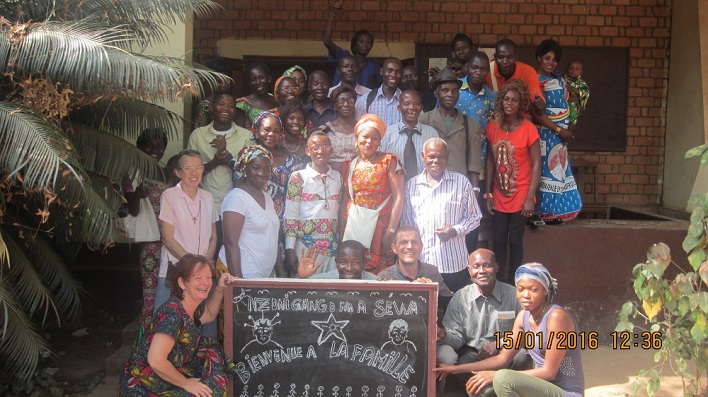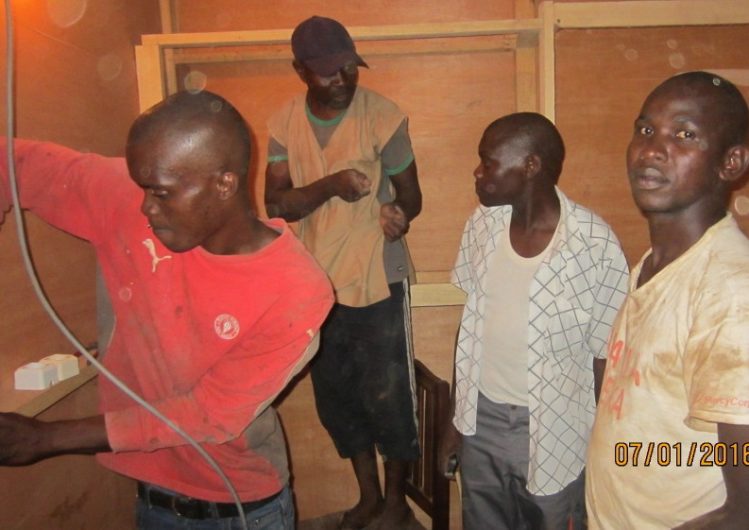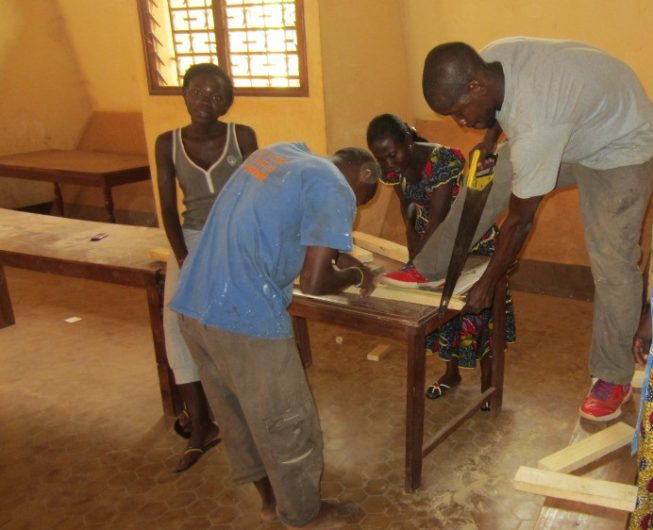Inventing a New Profession in the Central African Republic: Social and Cultural Mediators

In the 2013-2017 planning for ATD Fourth World-Central African Republic, a key goal is: “to encourage young people by teaching them to pay attention to the weakest people”. The aim is to do this by developing teaching methods that will enable all of them to succeed.
For the past several months, thanks to the advice of numerous social actors, activists and friends of ATD Fourth World, as well as the support of partners and sponsors, we have been able to develop a new training programme. “Social and Cultural Mediation” is a new work-and-study course that is raising hopes in the Central African Republic, a place where no training for this profession existed previously.
In the course, students develop their capacity to create (or renew) social ties for people who are mired in the daily violence engendered by poverty. Toward this end, the apprentice “social and cultural mediators” engage people: at the marketplace, in non-profit organisations, in health clinics, at schools, in youth clubs, with the media, or during interactions with local authorities. The training programme stresses the need to be open to those who have been left out of society, in order to build a country that leaves no one behind. To do so, the course emphasizes sustainable work that is developed by and rooted in knowledge and field practice.
The first class is made up of twelve individuals, including members of various non-profits, including: rural development, interfaith groups, coordination of peace volunteers, youth savings and credit networks, and ATD Fourth World’s Street Libraries and Tapori children’s clubs. Many are also involved in their local communities as literacy teachers, neighbourhood council members, or basketball coaches.
Not only do the students come from a wide variety of employment backgrounds, but they have diverse educational backgrounds. Some have been to university, while others attended only primary school. The students’ diversity enhances the course.
The Experimental Training Course for Social and Cultural Mediation began in January 2016. By the end of the course, each trainee, coached by three teachers, will have received 1,450 hours of theoretical training and completed two months of practicals. The course will provide each participant with a “professional apprenticeship”, thanks to the partners supporting this project of ATD Fourth World.
The National Agency for Vocational Training and Employment, in conjunction with the University of Bangui, are in charge of developing the curriculum and ensuring certification of acquired skills. Meanwhile, the fieldwork is supervised by several non-profits working on public health or special education for vulnerable young people. In addition, the Ministry of Education is interested in taking the program one step further by connecting the programme to schools in disadvantaged zones in order to create new bonds between families, schools, and the surrounding social and cultural environment.
This cooperation among academic and training and education agencies bodes well for the future.
The project has three fundamental aspects:
- Experimental: Grassroots experience is a crucial component of the course. As a result, the 12 mediators spend two days a week doing fieldwork. One third of the them are supporting ATD with a participatory action research project. In this project, they bring together the expertise of dozens of people (parents of children in school, parents of children who are not in school, teachers, and others who have key roles in their communities) to help society better understand the challenges connected to education. The others help run Street Libraries for children in several neighbourhoods in or near the city of Bangui.
- Training: The building blocks of knowledge are important to study or to rediscover for those whose schooling stopped early. Topics include French, accounting, history, conflict resolution, child psychology, and an overview of laws relating to children and youth. These classes take place at the Protestant Youth Centre, a place that is widely respected throughout Bangui. This centre has long offered young people both cultural activities and training in good citizenship, and remained open even throughout the dark years of the country’s history. All the trainees wanted to pitch in when this centre required some renovations! (See photos below.)
- Mediation: Trainees learn that it is most important to begin mediation efforts by reaching out to families and neighbourhoods that were abandoned or that might feel excluded from the current national and local reconciliation efforts. Creating or restoring social ties—starting by thinking with people who have been left out—must be the basis for healing communities.
The course will end in December 2016, with the aim of early 2017 seeing a new step in this project, where the trainees will begin working professionally as mediators. Hopefully, this pilot project will be followed up with the long-term training of future generations of Social and Cultural Mediators who can put their talents at the service of a country which is striving to leave no one behind.



